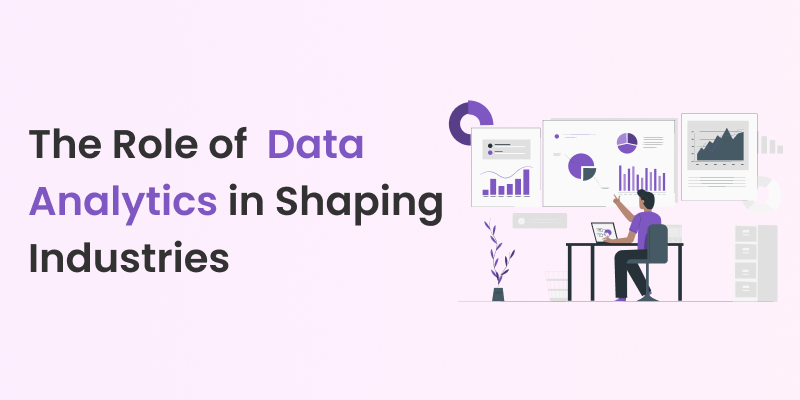In the digital age, data has emerged as the new currency that fuels business growth and innovation. Organizations across various industries are increasingly harnessing the power of data analytics to gain valuable insights, make informed decisions, and shape their strategies.

The Data Analytics Course offers comprehensive training in the transformative power of data analytics, equipping participants with the skills to harness valuable insights that shape industries. Explore real-world applications, from healthcare and finance to manufacturing and retail, and gain proficiency in leveraging data to drive innovation, optimize processes, and enhance customer experiences.
This blog delves into the transformative role of data analytics in revolutionizing industries, unlocking opportunities, and driving advancements.
Data Analytics: A Game-Changer for Industries
Data analytics is the process of collecting, processing, and interpreting vast volumes of data to uncover patterns, trends, and correlations. This information empowers businesses to optimize processes, improve customer experiences, and drive innovation. Across industries, data analytics has proven to be a game-changer, providing valuable advantages in various ways.
Healthcare:
Data analytics has revolutionized the healthcare sector by enhancing patient care, optimizing hospital operations, and enabling personalized treatment plans. Through electronic health records and patient data analysis, medical professionals can make accurate diagnoses, predict disease outbreaks, and prescribe tailored treatments. Furthermore, data-driven research helps identify potential cures and improves public health initiatives. Data analytics has played a crucial role in managing the COVID-19 pandemic, from tracking infection rates to predicting healthcare resource needs.
Retail:
The retail industry leverages data analytics to understand consumer behavior, optimize inventory management, and create targeted marketing campaigns. By analyzing customer preferences and purchase history, retailers can offer personalized recommendations, leading to increased customer satisfaction and loyalty. Additionally, real-time data analysis enables agile decision-making, ensuring stock availability and efficient supply chain management. Retailers also use data analytics to optimize pricing strategies and design promotions that resonate with their target audience.
Finance:
Data analytics has transformed the finance sector by enabling fraud detection, risk assessment, and personalized financial services. Banks and financial institutions use predictive analytics to evaluate credit risk and tailor loan offers to individual customers. Furthermore, data-driven insights assist in detecting fraudulent activities, safeguarding customers and organizations alike. Data analytics is also utilized in algorithmic trading, where massive amounts of data are analyzed to make split-second trading decisions, optimizing investment strategies.
Big Data: Empowering Industries through Insights
The proliferation of big data has accelerated the impact of data analytics across industries. Big data refers to the massive volume of structured and unstructured data generated daily through digital interactions, social media, IoT devices, and more. Harnessing big data’s potential empowers industries to gain deeper insights and make data-driven decisions.
Manufacturing:
In the manufacturing sector, big data analytics optimizes production processes, reduces downtime, and enhances overall efficiency. By analyzing sensor data from machinery, manufacturers can predict maintenance needs, minimizing unplanned downtime and maximizing productivity. Moreover, insights derived from big data enable better resource allocation and supply chain management. The concept of Industry 4.0, which heavily relies on data analytics and the Internet of Things (IoT), is transforming manufacturing by introducing smart factories that leverage real-time data for automated decision-making.
Transportation:
Data analytics plays a critical role in the transportation industry, facilitating route optimization, enhancing logistics, and improving safety. For instance, analyzing traffic data helps in predicting congestion patterns, enabling the implementation of dynamic routing solutions. Additionally, data-driven maintenance schedules enhance the reliability and safety of vehicles and infrastructure. Furthermore, data analytics is instrumental in the development of autonomous vehicles, where data from various sensors is analyzed to make real-time driving decisions.
Education:
In the education sector, data analytics assists educators in identifying student learning patterns and designing personalized learning experiences. By analyzing student performance data, educators can identify areas where students may be struggling and offer targeted support. This approach fosters better student engagement, leading to improved academic outcomes. Data analytics also helps educational institutions in improving administrative efficiency, enrollment management, and resource allocation.
Data Analytics and Customer Experience Enhancement
Delivering exceptional customer experiences has become a paramount goal for businesses in this competitive landscape. Data analytics serves as a valuable tool in achieving this objective by providing insights into customer preferences, pain points, and behavior.
Personalized Marketing:
Data analytics enables businesses to craft personalized marketing campaigns that resonate with individual customers. By analyzing past interactions, purchase history, and browsing behavior, companies can tailor their offerings to meet customer needs more effectively. This approach not only boosts customer satisfaction but also increases the likelihood of conversion and customer loyalty. Advanced data analytics techniques, such as sentiment analysis on social media data, further aid in understanding customer sentiment towards a brand or product.
Customer Feedback Analysis:
Collecting and analyzing customer feedback is crucial for understanding customer sentiment and identifying areas of improvement. Data analytics allows companies to process large volumes of feedback data, extract valuable insights, and promptly address customer concerns. By responding to customer feedback proactively, businesses can build trust and foster long-term relationships. Companies often use data analytics to implement customer feedback loops, where insights from customer interactions are continuously used to improve products and services.
The Future of Data Analytics in Shaping Industries
As technology continues to advance, the role of data analytics in shaping industries will only grow more significant. Several key trends are expected to drive the future of data analytics:
Artificial Intelligence (AI) Integration:
The integration of AI with data analytics will lead to more sophisticated predictive modeling and decision-making capabilities. AI-driven algorithms can process vast amounts of data quickly, allowing businesses to anticipate market trends and customer behavior with unprecedented accuracy. AI-powered chatbots and virtual assistants will also revolutionize customer support, providing personalized assistance and resolving queries promptly.
Edge Analytics:
With the rise of IoT devices, edge analytics will become more prevalent. Edge analytics involves processing data closer to the source, reducing latency and ensuring real-time insights. This will be particularly beneficial in industries where real-time data is crucial, such as healthcare and autonomous vehicles. Edge analytics will enable faster response times and enhanced decision-making in scenarios where immediate action is required.
Data Privacy and Security:
As data analytics becomes more pervasive, ensuring data privacy and security will be of paramount importance. Industries will invest heavily in robust data protection measures to safeguard sensitive information and comply with regulations like the General Data Protection Regulation (GDPR). Innovations in data anonymization and encryption will play a crucial role in maintaining trust between businesses and their customers.
Conclusion:
Data analytics has emerged as a transformative force across industries, reshaping the way businesses operate, interact with customers, and drive innovation. From healthcare to finance, big data analytics has proven its ability to unlock valuable insights and fuel growth. As the future unfolds, the integration of AI and the expansion of edge analytics will further amplify the impact of data analytics, propelling industries into a new era of success and innovation.
Embracing data analytics is no longer a choice but a necessity for organizations seeking to remain competitive and future-proof their operations. With a data-driven approach, industries can navigate complexities, capitalize on opportunities, and deliver exceptional experiences to customers, cementing their position as leaders in the ever-evolving landscape of business and technology.









